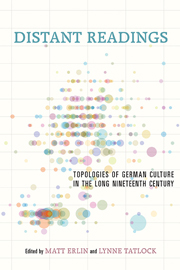Book contents
- Frontmatter
- Contents
- Acknowledgments
- Introduction: “Distant Reading” and the Historiography of Nineteenth-Century German Literature
- I Quantification
- II Circulation
- 6 The Werther Effect I: Goethe, Objecthood, and the Handling of Knowledge
- 7 Rethinking Nonfiction: Distant Reading the Nineteenth-Century Science-Literature Divide
- 8 Distant Reception: Bringing German Books to America
- 9 The One and the Many: The Old Mam'selle's Secret and the American Traffic in German Fiction (1868–1917)
- III Contextualization
- Selected Bibliography
- Contributors
- Index
6 - The Werther Effect I: Goethe, Objecthood, and the Handling of Knowledge
from II - Circulation
Published online by Cambridge University Press: 05 April 2014
- Frontmatter
- Contents
- Acknowledgments
- Introduction: “Distant Reading” and the Historiography of Nineteenth-Century German Literature
- I Quantification
- II Circulation
- 6 The Werther Effect I: Goethe, Objecthood, and the Handling of Knowledge
- 7 Rethinking Nonfiction: Distant Reading the Nineteenth-Century Science-Literature Divide
- 8 Distant Reception: Bringing German Books to America
- 9 The One and the Many: The Old Mam'selle's Secret and the American Traffic in German Fiction (1868–1917)
- III Contextualization
- Selected Bibliography
- Contributors
- Index
Summary
Übrigens habe ich das Buch, wie ich schon öfter gesagt, seit seinem Erscheinen nur ein einziges mal wieder gelesen und mich gehütet, es abermals zu thun. Es sind lauter Brandraketen! Es wird mir unheimlich dabei, und ich fürchte den pathologischen Zustand wieder durchzuempfinden, aus dem es hervorging.
Goethe, Gespräche mit Eckermann, January 2, 1824Our current project seeks to develop new ways of understanding the relationship between the novel and late eighteenth- and early nineteenth-century writing by focusing on one of the most popular novels of the period, Johann Wolfgang von Goethe's Die Leiden des jungen Werthers (The Sorrows of Young Werther; 1774/1787). With the steep rise of printed writing in the eighteenth century, epistolary novels like Goethe's Werther, Samuel Richardson's Pamela, or Jean Jacques Rousseau's Julie became landmarks of the new vibrancy of the publishing industry. They were some of the most persuasive signs of an emerging commercial literary modernity. As a fictional network of texts, the epistolary novel came to stand for a new culture of literary connectivity.
There has been a good deal of bibliographic research on the nature of such publishing events—enumerative accounts of the host of adaptations that arose from these singularly productive works. At the same time, there are a number of studies that engage at a more intimate interpretive level with particular adaptations or particular categories of adaptations (although in the case of Werther such studies are fewer than one might think).
- Type
- Chapter
- Information
- Distant ReadingsTopologies of German Culture in the Long Nineteenth Century, pp. 155 - 184Publisher: Boydell & BrewerPrint publication year: 2014



